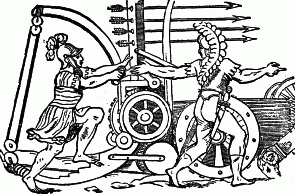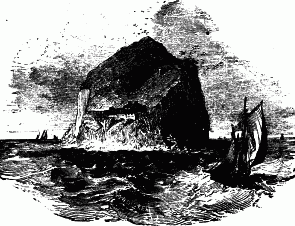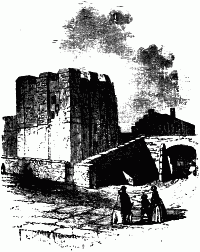
The chief foe of Marius was almost always his second in command, Publius Cornelius Sulla, one of the men of highest family in Rome. He had all the high culture and elegant learning that the rough soldier Marius despised, spoke and wrote Greek as easily as Latin, and was as well read in Greek poetry and philosophy as any Athenian could be; but he was given up to all the excesses of luxury in which the wealthy Romans indulged, and his way of life had made him frightful to look at. His face was said to be like a mulberry sprinkled with salt, with a terrible pair of blue eyes glaring out of it.
In 93 he was sent to command against Mithridates, king of Pontus, one of the little kingdoms in Asia Minor that had sprung up out of the break-up of Alexander's empire. Under this king, Mithridates, it had grown very powerful. He was of Persian birth, had all the learning and science both of Greece and the far East, and was said in especial to be wonderfully learned in all plants and their virtues, so as to have made himself proof against all kinds of poison, and he could speak twenty-five languages.
He had great power in Asia Minor, and took upon himself to appoint a king of Cappadocia, thus leading to a quarrel with the Romans. In the midst of the Social War, when he thought they had their hands full in Italy, Mithridates caused all the native inhabitants of Asia Minor to rise upon the Romans among them in one night and murder them all, so that 80,000 are said to have perished. Sulla was ordered to take the command of the army which was to avenge their death; but, while he was raising his forces, Marius, angry that the patricians had hindered the plebeians and Italians from gaining more by the Social War, raised up a great tumult, meaning to overpower the patricians' resistance. He would have done more wisely had he waited until Sulla was quite gone, for that general came back to the rescue of his friends with six newly-raised legions, and Marius could only just contrive to escape from Rome, where he was proclaimed a traitor and a price set on his head. He was now seventy years old, but full of spirit. First he escaped to his own farm, whence he hoped to reach Ostia, where a ship was waiting for him; but a party of horsemen were seen coming, and he was hidden in a cart full of beans and driven down the coast, where he embarked, meaning to go to Africa; but adverse winds and want of food forced him to land at Circæum, whence, with a few friends, he made his way along the coast, through woods and rocks, keeping up the spirits of his companions by telling them that, when a little boy, he robbed an eyrie of seven eaglets, and that a soothsayer had then foretold that he would be seven times consul. At last a troop of horse was seen coming towards them, and at the same time two ships near the coast. The only hope was in swimming out to the nearest ship, and Marius was so heavy and old that this was done with great difficulty. Even then the ships were so near the shore that the pursuers could command the crew to throw Marius out, but this they refused to do, though they only waited till the soldiers were gone, to put him on shore again. Here he was in a marshy, boggy place, where an old man let him rest in his cottage, and then hid him in a cave under a heap of rushes. Again, however, the troops appeared, and threatened the old man for hiding an enemy of the Romans. It was in Marius' hearing, and fearing to be betrayed, he rushed out into a pool, where he stood up to his neck in water till a soldier saw him, and he was dragged out and taken to the city of Minturnæ.

There the council decided on his death, and sent a soldier to kill him, but the fierce old man stood glaring at him, and said. "Darest thou kill Caius Marius?" The man was so frightened that he ran away, crying out, "I cannot kill Caius Marius." The Senate of Minturnæ took this as an omen, and remembered besides that he had been a good friend to the Italians, so they conducted him through a sacred grove to the sea, and sent him off to Africa. On landing, he sent his son to ask shelter from one of the Numidian princes, and, while waiting for an answer, he was harassed by a messenger from a Roman officer of low rank, forbidding his presence in Africa. He made no reply till the messenger pressed to know what to say to his master. Then the old man looked up, and sternly answered. "Say that you have seen Caius Marius sitting in the ruins of Carthage"—a grand rebuke for the insult to fallen greatness. But the Numidian could not receive him, and he could only find shelter in a little island on the coast.
There he soon heard that no sooner had Sulla embarked for the East than Rome had fallen into dire confusion. The consuls, Caius Octavius and Publius Cornelius Cinna, were of opposite parties, and had a furious fight, in which Cinna was driven out of Rome, and at the same time the Italians had begun a new Social War. Marius saw that his time was come. He hurried to Etruria, where he was joined by a party of his friends and five hundred runaway slaves. The discontented Romans formed another army under Quintus Sertorius, and the Samnites, who had begun the war, overpowered the troops sent against them, and marched to Rome, declaring they would have no peace till they had destroyed the wolf's lair. Cinna and an army were advancing on another side, and, as he was really consul, the Senate in their distress admitted him, hoping that he would stop the rest; but when he marched in and seated himself again in the chair of office, he had by his side old Marius clothed in rags.

They were bent on revenge, and terrible it was, beginning with the consul, Caius Octavius, who had disdained to flee, and whose head was severed from his body and displayed in the Forum, with many other senators of the noblest blood in Rome, who had offended either Marius or Cinna or any of their fierce followers. Marius walked along in gloomy silence, answering no one; but his followers were bidden to spare only those to whom he gave his hand to be kissed. The slaves pillaged the houses, murdered many on their own account, and everything was in the wildest uproar, till the two chiefs called in Sertorius with a legion to restore order.
Then they named themselves consuls, without even asking for an election, and thus Marius was seven times consul. He wanted to go out to the East and take the command from Sulla, but his health was too much broken, and before the year of his consulate was over he died. The last time he had left the house, he had said to some friends that no man ought to trust again to such a doubtful fortune as his had been; and then he took to his bed for seven days without any known illness, and there was found dead, so that he was thought to have starved himself to death.
Cinna put in another consul named Valerius Flaccus, and invited all the Italians to enroll themselves as Roman citizens. Then Flaccus went out to the East, meaning to take away the command from Sulla, who was hunting Mithridates out of Greece, which he had seized and held for a short time. But Flaccus' own army rose against him and killed him, and Sulla, after beating Mithridates, driving him back to Pontus, and making peace with him, was now to come home.
